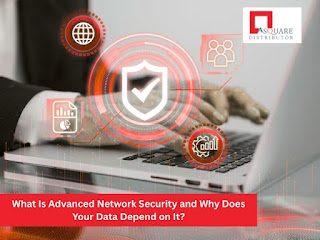Enterprise Networking Solutions: What They Are and Why You Need Them
In today's hyper-connected digital world, enterprise networking solutions form the backbone of successful business operations. Whether you’re running a multinational corporation or a rapidly growing startup, a robust, scalable, and secure network infrastructure is essential to support your communication, data sharing, and operational needs.
This comprehensive guide explores what enterprise networking solutions are, the key components involved, and why your business cannot afford to ignore them in 2025 and beyond.
What Are Enterprise Networking Solutions?
Enterprise networking solutions refer to the infrastructure, technologies, and services that allow businesses to connect their employees, data centers, branch offices, cloud platforms, and devices. These networks enable the secure and efficient transmission of data, support collaboration, and power critical business applications.
Common Types of Enterprise Networks:
-
Local Area Network (LAN): Connects devices within a specific location like an office.
-
Wide Area Network (WAN): Links multiple locations across cities or even countries.
-
Wireless LAN (WLAN): Offers wireless access within a business environment.
-
Software-Defined WAN (SD-WAN): Uses software-based technology to manage wide-area networks for better performance and flexibility.
-
Cloud Networking: Integrates cloud-based infrastructure and services into the business network.
Key Components of Enterprise Networking Solutions
A reliable enterprise network comprises several integrated components. Here are the most crucial ones:
1. Network Infrastructure
-
Routers and Switches – Core hardware that facilitates data transmission between devices and networks.
-
Firewalls and Gateways – Ensure secure data flow and protect against external threats.
2. Network Security
-
Intrusion Detection and Prevention Systems (IDPS)
-
VPNs (Virtual Private Networks)
-
Multi-Factor Authentication (MFA)
-
Next-Generation Firewalls (NGFW)
3. Network Management Tools
-
Help IT teams monitor network health, detect anomalies, and ensure optimal performance.
4. Cloud Integration
-
Hybrid networking between on-premise infrastructure and cloud platforms like AWS, Azure, and Google Cloud.
5. Wireless and Remote Access
-
Enables employees to securely access resources from anywhere, supporting hybrid and remote work models.
Why Your Business Needs Enterprise Networking Solutions
In an era of digital transformation, investing in enterprise networking solutions is not optional—it’s strategic. Here’s why:
1. Seamless Communication and Collaboration
Enterprise networks enable real-time communication via email, messaging apps, VoIP, and video conferencing. A well-structured network ensures minimal latency, faster data exchange, and uninterrupted connectivity.
2. Enhanced Productivity
With reliable connectivity and access to cloud services, employees can collaborate and complete tasks more efficiently. It eliminates bottlenecks caused by outdated infrastructure or slow connections.
3. Scalability and Flexibility
Enterprise networks are built to scale. As your business grows, your networking solution should be able to accommodate more users, devices, and applications without compromising speed or security.
4. Centralized Management and Monitoring
Modern enterprise networking solutions allow IT administrators to manage and monitor the entire network from a central dashboard. This makes it easier to troubleshoot issues, optimize performance, and deploy updates.
5. Improved Security
With the rise of cyber threats, securing your enterprise data is non-negotiable. Networking solutions come with built-in security protocols such as encryption, firewalls, threat detection, and access control.
6. Cost-Effective Operations
By optimizing network performance and reducing downtime, enterprise networks contribute to cost savings. Technologies like SD-WAN can also help cut costs by reducing the need for expensive MPLS connections.
7. Support for Remote Work
With remote and hybrid work becoming the norm, businesses need to provide secure and fast access to resources regardless of location. VPNs, cloud networking, and wireless solutions make this possible.
Key Technologies Powering Modern Enterprise Networks
1. SD-WAN (Software-Defined WAN)
SD-WAN is revolutionizing enterprise networking by offering cost-effective, cloud-friendly, and application-aware routing. It ensures high performance for cloud-based applications and enhances user experience.
2. Network Function Virtualization (NFV)
NFV allows network services to be hosted on virtual machines, making the network more agile and easier to scale without heavy hardware investment.
3. Artificial Intelligence (AI) in Networking
AI helps in predictive analytics, automatic troubleshooting, and optimizing bandwidth usage. AI-driven networks learn and adapt to usage patterns, making them smarter over time.
4. Wi-Fi 6 and Beyond
Faster wireless standards like Wi-Fi 6 provide greater capacity and better performance in dense environments, which is crucial for modern workspaces.
Choosing the Right Enterprise Networking Solution for Your Business
Not all businesses have the same networking needs. Choosing the right solution depends on several factors:
1. Business Size and Structure
A startup with a single office will have very different requirements compared to a multi-branch corporation.
2. Data Sensitivity
Industries like finance and healthcare require stricter compliance and security protocols due to the sensitive nature of their data.
3. Cloud Strategy
If your business relies heavily on cloud services, opt for solutions that support hybrid or fully cloud-native architectures.
4. Remote Work Needs
Ensure your network can support secure remote access, mobile device management, and collaboration tools.
5. Budget
While enterprise networks can be a major investment, solutions like SD-WAN, cloud networking, and virtualization help reduce costs over time.
Enterprise Networking Best Practices
To ensure your network remains effective and secure:
-
Regularly audit and monitor your network.
-
Implement redundancy and failover systems.
-
Stay updated with the latest firmware and security patches.
-
Train staff on cybersecurity awareness.
-
Choose reputable networking solution providers or managed service providers (MSPs).
Conclusion
Enterprise networking solutions are foundational to business success in today’s fast-paced digital landscape. They ensure connectivity, security, and scalability—empowering organizations to grow without limits.
Whether you're a growing startup or an established enterprise, investing in the right networking infrastructure is a step toward improved efficiency, data protection, and long-term sustainability.




Comments
Post a Comment